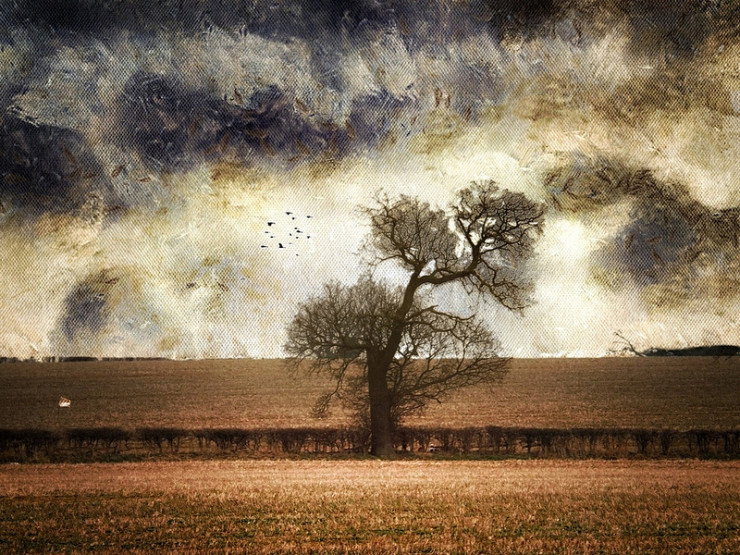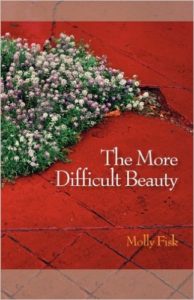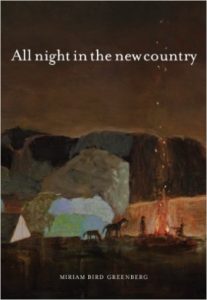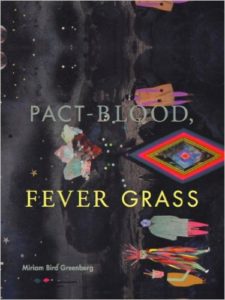Strong, vivid imagery is a hallmark of good poetry, and indeed all good writing. Two poets with recent collections demonstrate the value of imagery in developing a theme and creating a story.
The More Difficult Beauty by Molly Fisk is filled with poems that use strong imagery. Whether she’s writing about women turning 40, the Truckee River, Junior Mints and other candy, or Joe’s Taco Lounge in Mill Valley, the images she uses are strong and striking, and also advance the story she’s telling.
Here’s an example, a story of driving on an interstate highway, with the memory of “him” (unnamed and undescribed) uppermost:
on the Interstate, one of those towns
where it’s never not hot—the oleander bakes
between blistered lanes. It’s not even summer.
At the crusted window I order a cheeseburger
and fries. I settle the paper sack in my lap,
partly in his honor, but also because
I am travelling: this is road food: at any hour,
accompanied by a styrofoam cup of weak iced tea
and maybe a cigarette, it can improve
your driving—this time of year when those little
anonymous carpets of roadside vegetation
begin to bloom, a two week window
when their insistent yellow matches the center line
so exactly it’s a miracle, a signal from God or
outer space or whatever we still believe in.
All of the elements of the poem—oleander, blistered lanes (which sounds far better than “a hot day”), the crusted window, the fast food order, the “anonymous carpets of roadside vegetation, ” all work together to tell a story of what looks like a woman driving away from a relationship, a love affair, with a single actual reference to “him.” All of the poems in the collection are similar, approaching a subject indirectly but leaving little doubt what is happening—and it’s because of how she uses imagery.
Fisk received her B.A. degree from Radcliffe College / Harvard and an MBA degree from the Simmons College Graduate School of Management (a poet with an MBA degree!). She has received numerous fellowships (including one from the National Endowment for the Arts), several poetry prizes and a grant from the Corporation for Public Broadcasting. She is the author of two previous poetry collections, Terrain (1998) and Listening to Winter (2000); and Using Your Turn Signal Promotes World Peace (2005) and Blow-Drying a Chicken: Observations from a Working Poet (2013), both collections of radio essays. She lives in Nevada City, California.
Two collections by Miriam Bird Greenberg, both published in 2013, demonstrate a similar use of strong imagery.
In All night in the new country, Greenberg writes of “disconnectedness”—the sense we all share from time to time of feeling part of the life around us and yet separated from it. This may be particularly acute for poets and novelists, because part of what we do is observe and describe. The subject of her poems range from work in a laboratory, an old legend of a horse and rider, and utopia, to seeing three girls kill a goat. Watch what she does with the images in this poem, and how she maintains distance from what she’s describing.
There was a woman who walked the roads all day;
she would come into the café
holding a handkerchief full of bees
then shake them free. You could see her catching them
painstakingly all morning
in the honeysuckle, her face
scabbed where she’d scratched old stings.
She had a daughter
who’d died of lockjaw
after the hospitals had closed;
she was buried by the graves of the great-aunts
who’d raised her, enough
to make anyone crazy. She called
all children her daughter’s name. For a time
she slept in the fallen-in blacksmithing
shed in back of our house.
From inside my dreams
I could hear her some nights
calling out, Ruth, Ruth.
This sense of “disconnectedness” or separation is also present in her collection Pact-Blood, Fever Grass. Whether she addresses the changing seasons, a time of mourning, burial, or children coming to the city, Greenberg marries separation with strong images.
Toll the church bell
all day to count the dead one’s age.
Send someone with a letter
in a black-bordered envelope
to the relatives on the far end
of the mountain.
Wash the body, lay it up
on a plain plank
till the casket arrives.
Strip the bed, scald everything
in an iron pot in the yard.
Split a shirt down its back
to dress the body
before it stiffens. Then wait up
all night singing hymns
softly until daybreak comes,
in the corners anyone still awake
telling their stories:
When I washed my husband,
says one, I found a birthmark
I never knew he had.
The images—the black-bordered envelope, splitting the shirt down the back, the singing of hymns—all vividly suggest the preparation of a body for burial. And the last sentence of three lines is the clincher—the idea of unfamiliarity with one’s husband, that sense of separation even from those closest to us.
Greenberg studied at the University of Pittsburgh and received an MFA in poetry from the Michener Center for writers. She is a Wallace Stegner fellow at Stanford University. She lives in Oakland, California.
No question about it: imagery is a critical aspect of poetry, and using it well, as Molly Fisk and Miriam Bird Greenberg do in these collections, significantly enhances the strength and quality of the writing.
By the way, I usually don’t comment on the book covers for poetry collections, but the covers in all three of these collections are some of the most intriguing and arresting I’ve come across.
Photo by Andy B, Creative Commons, via Flickr. Post by Glynn Young, author of the novels Dancing Priest and A Light Shining, and Poetry at Work.
__________________________

“I require all our incoming poetry students—in the MFA I direct—to buy and read this book.”
—Jeanetta Calhoun Mish
- Longfellow’s “Paul Revere’s Ride”: Creating a National Legend - April 17, 2025
- Poets and Poems: Katie Kalisz and “Flu Season” - April 15, 2025
- Poets and Poems: Michelle Ortega and “When You Ask Me, Why Paris?” - April 10, 2025






Matthew Kreider says
Thanks for sharing these fine voices, Glynn.
Marilyn Yocum says
These poems, as well as your observations, were good company over Saturday lunch. Thank you!